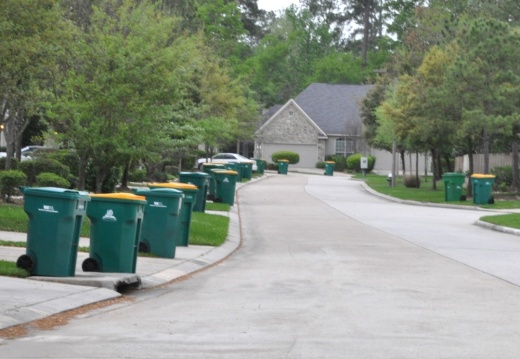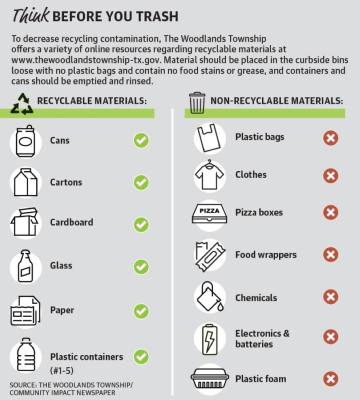Over 95% of households in The Woodlands Township recycle, resulting in nearly 30% of all household waste being diverted from the landfill, according to John Geiger, environmental services manager with The Woodlands Township.
Geiger said recycling contamination—which is material placed in a residential curbside recycling bin that is not recyclable—remains a challenge. According to Geiger, common contaminants in The Woodlands include plastic bags, cords, string, food waste, hazardous waste and plastic foam, and these items harm machinery, endanger workers and reduce the value of the approved materials.
To address recycling contamination, the township launched the Recycle Right program in 2020 to educate residents on contamination. The average annual contamination rate decreased roughly 30% from 2019-21, according to township data.“Maintaining low contamination is an important step in keeping The Woodlands recycling program going strong, and every household plays a role,” Geiger said.
The Woodlands Township recycling programs came into creation after changes in the global recycling market, including increased costs. China, which had been the world’s largest importer of waste plastics, implemented a ban on imported waste that went into effect in 2021, according to the U.S. Environmental Protection Agency.
Geiger said the ban on recyclables did not affect the kind of recyclable material accepted through residents’ curbside recycling, and he does not expect the township to limit the list of accepted materials.
However, in 2020, residents did see a 26% increase in the household cost for Waste Management services, which include recycling collection and processing, collection and disposal of trash and other debris. In February 2020, the township recontracted with Waste Management, providing services for a monthly household rate of $15.55. As of 2022, the township budgets $7.5 million for solid waste services.
“Higher recycling costs, owing in large part to changes in the international market, along with higher overall operating costs ... were the basis for the rate increase,” Geiger said.
The township also offers educational resources and allows residents to purchase compost bins in an effort to promote composting.“Our goal is to eventually establish residential curbside collection of food waste, just like trash, recycling and yard trimmings,” Geiger said.






